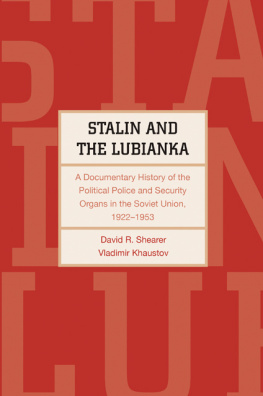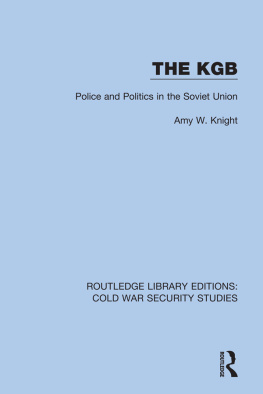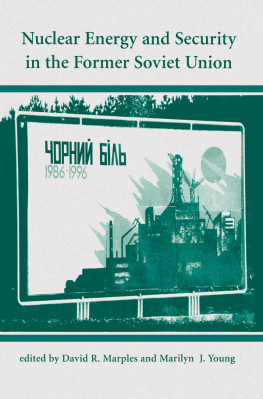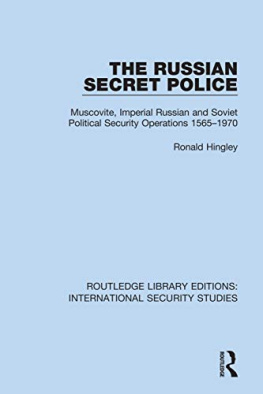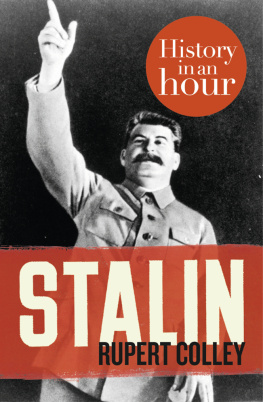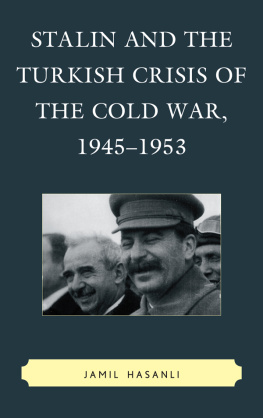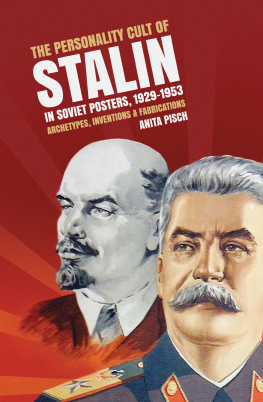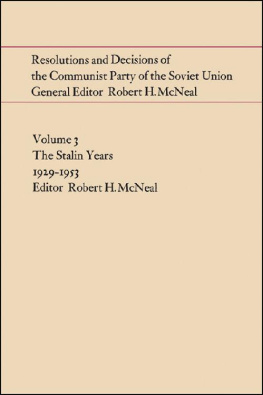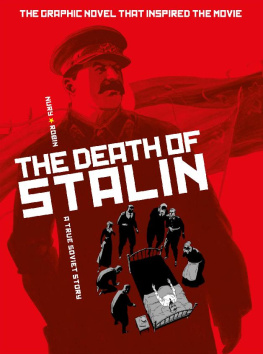ANNALS OF COMMUNISM
Each volume in the series Annals of Communism will publish selected and previously inaccessible documents from former Soviet state and party archives in a narrative that develops a particular topic in the history of Soviet and international communism. Separate English and Russian editions will be prepared. Russian and Western scholars work together to prepare the documents for each volume. Documents are chosen not for their support of any single interpretation but for their particular historical importance or their general value in deepening understanding and facilitating discussion. The volumes are designed to be useful to students, scholars, and interested general readers.
PROJECT EDITOR OF THE ANNALS OF COMMUNISM SERIES
William Frucht, Yale University Press
AMERICAN ADVISORY COMMITTEE
Ivo Banac, Yale University
Zbigniew Brzezinski, Center for Strategic and International Studies
William Chase, University of Pittsburgh
Friedrich I. Firsov, former head of the Comintern research group at RGASPI
Sheila Fitzpatrick, University of Chicago
Gregory Freeze, Brandeis University
John L. Gaddis, Yale University
J. Arch Getty, University of California, Los Angeles
Jonathan Haslam, Cambridge University
Robert L. Jackson, Yale University
Norman Naimark, Stanford University
Gen. William Odom (deceased), Hudson Institute and Yale University
Daniel Orlovsky, Southern Methodist University
Timothy Snyder, Yale University
Mark Steinberg, University of Illinois, Urbana-Champaign
Strobe Talbott, Brookings Institution
Mark Von Hagen, Arizona State University
Piotr Wandycz, Yale University
RUSSIAN ADVISORY COMMITTEE
K. M. Anderson, Moscow State University
N. N. Bolkhovitinov, Russian Academy of Sciences
A. O. Chubaryan, Russian Academy of Sciences
V. P. Danilov, Russian Academy of Sciences
A. A. Fursenko, secretary, Department of History, Russian Academy of Sciences (head of the Russian Editorial Committee)
V. P. Kozlov
N. S. Lebedeva, Russian Academy of Sciences
S. V. Mironenko, director, State Archive of the Russian Federation (GARF)
O. V. Naumov, director, Russian State Archive of Social and Political History (RGASPI)
E. O. Pivovar, Moscow State University
V. V. Shelokhaev, president, Association ROSSPEN
Ye. A. Tyurina, director, Russian State Archive of the Economy (RGAE)

Published with assistance from the foundation established in memory of Amasa Stone Mather of the Class of 1907, Yale College.
Copyright 2015 by Yale University.
All rights reserved.
This book may not be reproduced, in whole or in part, including illustrations, in any form (beyond that copying permitted by Sections 107 and 108 of the U.S. Copyright Law and except by reviewers for the public press), without written permission from the publishers.
Yale University Press books may be purchased in quantity for educational, business, or promotional use. For information, please e-mail (U.K. office).
Set in Sabon type by IDS Infotech, Ltd.
Printed in the United States of America.
Library of Congress Cataloging-in-Publication Data
Shearer, David R., 1952. Stalin and the Lubianka : a documentary history of the political police and security organs in the Soviet Union, 19221953 / David R. Shearer and Vladimir Khaustov.
pages cm.(Annals of communism)
Includes bibliographical references and index.
ISBN 978-0-300-17189-1 (hardback : alkaline paper) 1. PoliceSoviet UnionHistory. 2. PoliceSoviet UnionHistorySources. 3. Internal securitySoviet UnionHistory. 4. Lubianka (Prison : Moscow, Russia)History. 5. Political prisonersSoviet UnionHistory. 6. Stalin, Joseph, 18791953Influence. 7. Power (Social sciences)Soviet UnionHistory. 8. Social controlSoviet UnionHistory. 9. Soviet UnionPolitics and government19171936. 10. Soviet UnionPolitics and government19361953. I. Khaustov, V. N. (Vladimir Nikolaevich). II. Title.
HV8224.S3757 2015
363.2094709041dc23
2014012361
A catalogue record for this book is available from the British Library.
This paper meets the requirements of ANSI/NISO Z39.48-1992 (Permanence of Paper).
10 9 8 7 6 5 4 3 2 1
Yale University Press gratefully acknowledges the financial support given for this publication by the John M. Olin Foundation, the Lynde and Harry Bradley Foundation, the Historical Research Foundation, Roger Milliken, the Rosentiel Foundation, Lloyd H. Smith, Keith Young, the William H. Donner Foundation, Joseph W. Donner, Jeremiah Milbank, the David Woods Kemper Memorial Foundation, and the Smith Richardson Foundation.
Contents
Preface
V adim Staklo, of Yale University Press, first suggested a history of the Soviet political and security police. He was right to do so. Much has been written about particular aspects of the Soviet political police, but no single account existed of the Soviet political and security organs for the first thirty years of their existence. This volume is an attempt to provide such a history, at least for the first and formative decades of the Soviet state, from the early 1920s to the mid1950s. It is both a narrative history and a document collection, combining interpretive text with translations of important as well as indicative documents from the period. Most of the documents, though not all, are taken from the four-volume series Lubianka, Stalin, published in Russia during the early and mid2000s. Lubianka, of course, refers to the large nineteenth-century buildings on Lubianka Square, in downtown Moscow. That complex served as headquarters for the Soviet political and security organs throughout the twentieth century, and still serves as the headquarters of the Russian Federation security service, the FSB.
The documents in the Lubianka, Stalin series, and in this volume, come from a number of archives, but many are from collections in the still highly restricted archives of the security organs, and the Presidential Archive of the Russian Federation. Other major archival sources include the State Archive of the Russian Federation, the Russian State Archive of Social and Political History, the Russian State Archive of Contemporary History, and the State Archive of the Novosibirsk Oblast. Some of the documents in this volume were already published prior to the appearance of the Lubianka, Stalin series. Several have appeared in English translation, and these are noted. The great majority of the documents, however, appear here for the first time in English. Together, with the text, they tell a story previously untold, of the growth of the Soviet political and security organs, and the various and evolving functions of those organs in the realm of domestic and foreign spying, state security, and political and social repression.
This is more than a story of repression, however. During the first decades of the Soviet state, the history of the political police was inextricably tied to the rule of Joseph Stalin, the general secretary of the ruling Communist Party. Stalin became secretary in 1922, a position that became known as general secretary during the final illness of the founder of the Soviet state, Vladimir Lenin, and after the tumultuous years of revolution and civil war from 1917 to 1921. Stalin was not one of the early charismatic leaders of the Bolshevik Party, but he quietly asserted himself, and he did so largely through an alliance with key individuals in the political police. By the early and mid1930s, Stalin rose to be the undisputed and ruthless leader of the country and, as this book shows, he did so largely through his ability to use the political police. He dominated the country, and the political police, until his death in early March of 1953. His rule became synonymous with the power of the political police, and in turn, the extent of power wielded by the police and security organs would have been impossible without Stalin. This power was never secure, however. Stalin manipulated the balance between the police and the ruling Communist Party, using each in turn to purge and maintain control over the other. The documents herein reveal this dynamic of Stalins power, as well as the expanding, shrinking, and often changing functions of police activities over the decades of Stalins rule.
Next page
